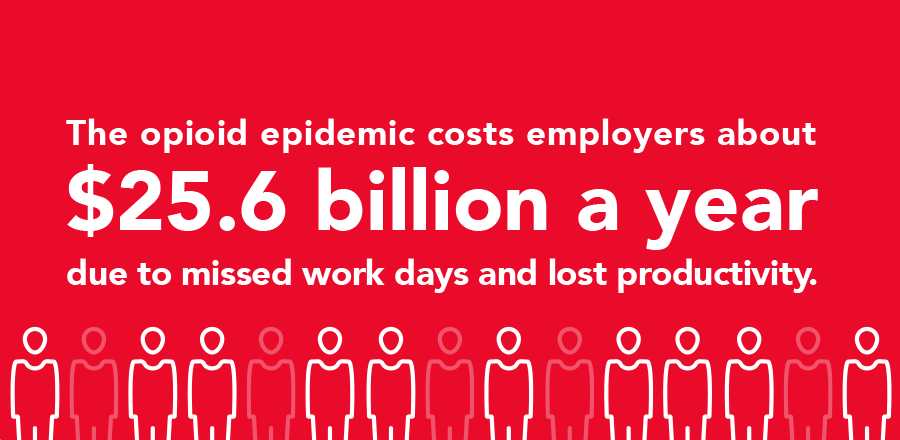
The opioid crisis is no longer just a crisis– it’s a full-blown epidemic. Opioid overdoses lead to more than 130 deaths every day in the U.S. That’s one death every 11 minutes. And for companies who want to take care of their employees and their families, the rise in drug misuse can be a concern on both a personal and a business level. Employees affected by an opioid addiction can not only bring productivity down, but also raise compensation claims and health care costs. So it’s important to consider how you can help prevent opioid addiction in your workforce and provide the necessary support to those who might be affected.
 Recognizing the issue
Recognizing the issue
It’s not just at-risk communities who are at risk. Addictions often begin when opioids are prescribed for reasons like chronic pain and recovery from surgery. Without the resources needed to properly manage their prescription, anyone—working any kind of job—can be subject to an opioid’s addictive nature. “It’s not a defect of character,” says Bill Brewster, VP of Harvard Pilgrim’s New Hampshire market, “It is like any other illness that anybody has.” Dr. Brewster has seen the effects of this issue firsthand, when his son struggled with an opioid addiction. “This is not them; this is us,” Dr. Brewster states in The New Hampshire Union Leader. “We’re all in this together.”
In a 2015 systematic review of health care data, 21-29% of patients who were prescribed opioids for chronic pain ended up misusing them. And this misuse only continues to rise in the U.S. In fact, 1/3 of Americans say they know someone who is or has been addicted to opioids, so it’s important to consider that an employee may have a family member who’s struggling—and who could be on your health plan.
 Hidden financial risks
Hidden financial risks
One employee working under the influence is a risk to your business and entire workforce, whether they’re writing up a proposal, interacting with a client, or operating heavy machinery. But while the physical risks of drug abuse can be obvious, the financial risks can be harder to see. Employees prescribed even one opioid pill were found to cost four times more in workers’ comp claims than those who weren’t prescribed any. Meanwhile, missed work days and lost productivity due to the abuse of prescription painkillers cost employers an estimated $25.6 billion a year.

 Prevention and support
Prevention and support
Health insurance companies can be a critical advocate for empowering businesses and employees impacted by opioids. They can partner with physicians and pharmacists when a patient requires opioids to make sure non-opioid options are considered and covered as alternatives. Many offer free benefits, like nurse care managers, who can work with their members to find alternative solutions for chronic pain, and personal health coaches, who can help patients manage their prescription opioid intake. They can also help people find support groups and other services dedicated to overcoming addiction.
While the economic burden is clear, what’s happening on the ground floor is not. Addiction is personal, emotional, and often invisible. On top of that, your employees’ health is a private matter, so confronting someone about a suspected addiction could result in legal issues. But by partnering with your health insurance company to offer resources for prevention and addiction support, you can help keep your business and your employees safe from risk.
Learn about opioid services and solutions that can help you and your employees prevent addiction, treat a problem, and find support in the opioid epidemic.